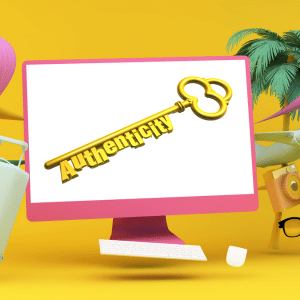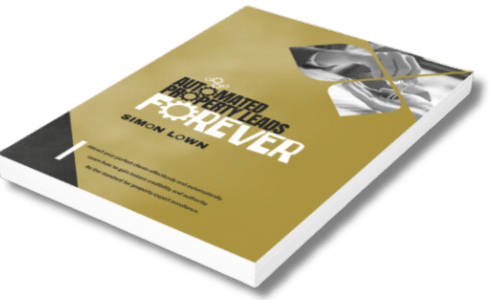Creating a content goldmine is one of the best ways to boost your online presence and build your website authority. As ever, there is more to it. In this post, I’ll touch on several things you can do to ensure your website works for you and how your online presence can be one of your most significant assets.
Before we get into it, I want to cover a few general terms so we’re on the same page and working towards the same goal.
Website Authority
Your website’s authority is determined by the search engines. They do this by measuring the quality and quantity of inbound links, amongst other metrics. The more authority a site has that links back to you, the more relevant it is and the greater its effect on your perceived expertise and trustworthiness.
The quantity of links is down to various website citations and social media links. This can include multiple other social metrics, such as followers and shares.

The perceived authority of your website will increase as you get more users who consume your content or services and engage with their own likes, comments and shares, as well as signing up for your various offerings and downloading your content upgrades.
This is a simplistic overview of SEO, but for the purposes of getting you started, there’s no need to get in-depth into SEO tactics and strategies. If you follow my outline for creating expert content, much of your on-page SEO will be baked in. The rest can be sorted out later.
Online presence
Your online presence is very much what it sounds like. It is the sum of your online footprint as a person and/or organisation.
This includes anywhere you show up:
- Websites – multiple if you have them and they are linked
- Social Media – business and personal where linked
- Directories
- Forums
- Podcasts
- Review Sites and testimonials
- Advertising
- Brand Mentions on other sites
The more places you show up and engage with your audience, the more robust your online presence will be. The bigger your footprint gets, the more credibility and awareness you will generate.
Increased visibility

As you build your online presence, you’ll positively impact your website authority. This, in turn, will help with your search engine results pages (SERPs) position.
As you appear higher in Google’s SERPs, you’ll get more website traffic and increase your online presence and authority even further. It’s a perpetual cycle of improvement that allows people to find and engage with your brand more easily.
Credibility and trust
To be a credible and trustworthy source of information, you need something people want. While the product or service (I’ll stick with services only from hereon in, but it also applies to products) you provide might be valuable, it’s the catch-22 of modern-day society.
For people to buy your service, they need to trust you. So, where does that trust and credibility come from?
Well, if you’re not a well-known, trusted, authoritative mega brand already, you’ll need something else your perfect prospects want before they get to the purchasing stage.
Fortunately, this is something you can provide.
INFORMATION
By providing knowledge to people looking for a service you provide, you can position yourself as an expert and start the process of building trust, credibility and rapport with the people you’ll eventually work with.
Your Competitive Advantage
By having a large online footprint that leads back to an authoritative website, whenever people search for answers locally, you are the expert most likely to appear with the answers they need.
In time, building your followers on social media and your email list will help boost your rankings on Google, making you ever more visible and accessible to the prospects in your area.
If you’ve built your content goldmine the right way, you’ll be able to capture the details of your website visitors and start nurturing and qualifying them into hot prospects and, eventually, clients.

Since most of this happens on autopilot, you’ll have more time to do what you want. Whether that’s growing your business and making even more expert content or just maintaining your content to keep the leads coming in without spending a fortune on paid ads and portals.
What More Do You Need?
In the rest of this guide, I’ll look at the main areas you’ll need to focus on to ensure your online authority and presence are as good as they need to be to attract your perfect prospects, including:
- Content
- SEO
- Social Media
- Reputation Management
Content Marketing
Think of content marketing as a way to share your expertise, experience, and values with everyone who needs your help but without them needing to visit your office, pick up the phone, or send you a message.
There is a marketing myth that everyone online is available to you with a few clicks of a mouse. This is partially true with media giants such as Google, Facebook, and all their competitors offering targeted ads. But, continuously reaching everybody over a long period will cost serious amounts of cash.
For anyone who doesn’t get paid upfront, this is a major problem.
The Online Marketing Myth Busted

Instead of thinking everyone is available to you with a few clicks of a mouse, reverse that idea. You are available to everyone sitting in front of a keyboard and searching Google or who speaks a few words into their smart device looking for answers.
Content marketing is the magic that means you show up when people go looking.
For this work effectively, there are a few things you need to do.
Strategy and Buyer Personas: Get Them Right
Would you advise a student looking for a studio the same way you’d advise a family of five? Of course not! You need to tailor your content based on who’s reading.
You might think I’m discussing regular buyer personas and creating demographic and psychographic profiles. I won’t tell you not to, especially if you’ve already researched and made them, but you don’t need them to get started.
The difference between targeting a student and a family of 5 can be much more easily defined by listing the problems each will face and the best ways to overcome them.
While there will undoubtedly be commonalities between each group, you can work out how to show up when they search for answers by understanding the problems as they perceive them and creating content accordingly.
This is a much more effective strategy to start a content goldmine than trying to use the standard marketing tactics of a multinational corporation.
Content Creation Best Practices
When you start creating your content, there aren’t any hard and fast rules.
When creating your content, you want your voice, personality and values to come through as much as possible. While there are best practices, which I’ll cover soon, the closer you stay true to yourself, the better your content will be.
Being authentic is a top priority for everything you create.

What Works Best?
There is little point in writing about what works best in a blog post. The truth is that while the core marketing strategies that have worked for the last 100 years don’t change, the tips, tricks and tactics that work on the various platforms are constantly evolving.

The best strategy for any content is to research your competitors, the bigger, the better, and see what they’re doing. Once you know what they are doing, check out the specialist and see what they are saying about what works best. Then, create some content and test it based on your research. Your experience and a sense of what you would expect to find online will also guide you. If you miss your mark, so what? You can always have another go. Nobody gets it right on their first attempt.
The quickest way to test is with paid ads. But if you’re not at a stage where paying to test new content strategies is viable, stick to building your content goldmine and providing as much value as possible. It’s a much longer-term strategy, but you can do it for yourself until you’re ready to invest in expert help. Just keep learning and applying your newfound knowledge until it starts to pay off with extra leads, prospects and sales.
Doing Nothing is Your Biggest Risk
This might seem like a risky and directionless strategy, but honestly, providing value and finding your voice will only happen when you start the process. You can think about what your brand might look like online as much as you want. It’s just a dream until you start putting content out there and testing.
The biggest risk is doing nothing.
It’s only directionless if you don’t follow the best practices for creating expert content.
You won’t know what needs to be changed until you have something to test.
Get started NOW!
Blogging
Your blogs are the foundation of your content goldmine. Create in-depth, valuable content that solves people’s problems. Share insights, property reviews, and market trends.
Right now, longer-form, in-depth content is more likely to be commented on and shared. It is also more likely to rank highly on Google. It could be completely different in six months or a year, though I doubt that. SEMrush’s STATE OF CONTENT MARKETING report is an excellent resource for staying current on what’s working with content strategies.
Video Marketing
To get started, I recommend you use your blogs as a script to make videos that provide value. If you can do interviews with other experts, great. Do those, too.
You need to find your voice and style; the only way to do that is to get started. You won’t be a fully polished speaking specialist when you start making your video content. However, you might consider adding a few flaws to your content if you are. That might sound counterintuitive, but perfectly presented videos don’t do as well as presentations that include mistakes and feel more, well, human and natural. If your videos are too perfect and professional, they will do worse, even if you’re not selling anything.
Authenticity is better than perfection.
Just don’t take it too far. You don’t want to sacrifice the video quality on purpose. The sound still needs to be excellent. You don’t want shaky camerawork or poor lighting. Just don’t strive for perfection too much; it’s not a requirement.
Infographics
These are the opposite of a video and should always be perfect. Infographics are ideal for breaking down complex property data, for example, into a simple-to-understand format.
While they look simple, a deep level of understanding about the subject is required to simplify it into a practical, accurate, and relevant infographic.
Content distribution
Part of your mission when creating great content is to make it as evergreen as possible. Got a killer piece? Push it out on all channels. But once you’ve launched it, you’ll want to keep returning to it repeatedly. This is when you’ll only push it to one channel at a time, so you have different content on each channel. You don’t want to appear like a one-trick pony and have the same thing everywhere all of the time unless you’re promoting an event or some other one-time deal.
Promoting Your Content
You know you need to do this, but have you considered why?
If you are one of the property experts who know of others who aren’t as qualified, experienced, or conscientious as you but still charge the same as or more than you, then you see one of the big problems in the UK property industry.
There’s no way to sugarcoat this; if you’re not creating expert-level content and promoting it as much as possible, you are part of the problem.

Your competitors can get away with offering inferior services and expertise because you haven’t educated their prospects on what they should expect and turned them into your prospects.
You didn’t show up when they were looking for answers.
Yes, it’s true. You need to take personal responsibility for the lack of quality information that would prevent them from choosing the best option.
If you promote your content effectively and continuously enough to become a respected source of information, you become a part of the solution and reap the rewards of the efforts that serving your community brings.
That’s more leads, prospects, and clients. Just in case you were wondering.
Social media

As you might expect, social media is essential to your content goldmine. Promoting your services, deals, or latest instructions is often very hit-and-miss. This may be because you don’t fully understand your audience, or it just isn’t big enough and filled with suitable prospect types.
Who knows (It will be slightly different for everyone). If you only use social media to promote offers or properties and you haven’t set it up, so that is precisely what people expect, you’ll not get very much engagement.
That will be the death of your organic reach.
The clue is in the name. It’s “SOCIAL” Media. One of the best ways to be social is to ask questions, provide value, and give feedback. This will make you much more approachable and help establish you as an expert. Let’s face it: if you’re doing the same as everyone else, you’re hardly going to stand out. Don’t be another sheep using social media as a platform to promote, promote, promote.
Be the expert who delivers value and engages with your audience in a meaningful way.
Email marketing
Your email list is a much better way to make offers, especially since you can personalise them not just to the recipient but their circumstances.
Instead of making your email list another promotional tool like everyone else, you can deliver more value, insights, and tips to help your perfect prospects achieve their goals. If you’re only sending out a promotion every 4 or 5 emails, the chances of your messages being opened and engaged with are much higher than if they are being ignored or filtered because they know you’re still trying to “sell them” in every message.
When you dive deeper and give your subscribers valuable information, the offers and exclusives will be far more likely to have an impact.
Influencer marketing
I want you to think about influencers in two ways. If you’re not effectively a household name in your area, then building relationships or paying for the services of somebody who is works really well.
They don’t need to be a superstar influencer. Micro-influencers are becoming recognised as a valuable source for partnerships since their small audiences can be highly targeted and engaged.
If you’re a well-established but not well-known property expert, your content goldmine is the perfect tool to begin positioning yourself as a local influencer.

Appearing on other influencers’ publications, podcasts, YouTube channels, or even speaking at events will all help you establish yourself as a go-to expert. With your content goldmine, you can host others, share backlinks, and even cross-promote complimentary services, making your site even more valuable to visitors.
When you think about influencer marketing, ideally, you want to be one of the influencers. If you’re not creating valuable content and publishing regularly, you’re essentially leaving your influencer status to chance. Please don’t do that.
Creating expert blog posts, recording them for your YouTube channel, promoting them on your social channels, and showing up on search engines is your very best chance of standing out as the go-to expert in your area. There is nothing left to chance here. Everything you create can be tracked, modified, enhanced, and improved at a later date. If you don’t create them, nobody will do it for you. Well, okay, unless you pay them, probably quite a lot of money.
Common Mistakes: Content Bloopers
If you want your content to do well, you must avoid the mistakes that stop people from consuming it.

Here are the mistakes you’ll find, or more specifically, you won’t find on page #1 of Google:
Not Optimising Content for SEO
Forgetting keyword research, metadata, alt text, etc. This leads to poor search visibility. Check out my What is SEO? post to learn more about SEO in a non-techy speak. It’s much easier than you think.
Over-Promoting Services
Focusing too much on promoting yourselves vs providing value to readers. It comes across as salesy. And, yes, I do realise that I promote my book in every post. If your service is only £6.95 and you provide as much value as I believe my posts do, you can promote every time you hit the publish button too. 😉
If, like most property professionals, your service starts from several hundred and ranges into thousands, then you’ll need to build a lot more trust and rapport before you start “selling” yourself or your services.
Ignoring Readability
Blocks of dense text without formatting make content hard to digest, and people won’t stick around to finish it. You have to ensure your content looks good as well as solving people’s issues in a simple to easy-to-understand way.
Use of Headings and sub-headings is a good place to start. Adding images, videos, bullet points, quotes, and all the other elements that make your content interesting is a surefire way of making your content interesting enough for people to stick around and finish reading.
Outdated Information

Old stats, outdated market data, and obsolete legal references are all simple ways to make your content appear amateurish and unprofessional. It also makes you seem less knowledgeable and untrustworthy.
This is the very last thing you want from your content. It is the exact opposite of what you’re trying to achieve. You have to maintain your content once you’ve created it, or you may find yourself rapidly losing credibility.
I have a large section in my book about maintaining your content goldmine. In it, I talk about reviewing, validating, and overdelivering with your content. If you don’t yet have a content goldmine, then this section is also very helpful in showing you what you’ll need to plan for in future once you’re regularly publishing and promoting your expert posts.
Dare I say, the cost of the book is worth it for this section alone. Yup! I think I do and just did.
Typos and Grammatical Errors
Despite what some gurus suggest, this undermines perceived professionalism and authority. I get that an email or web page with typos and errors can generate sales; these are often for low-ticket sales and lead magnets.

To me, and many others, it just says the page’s author is lazy and doesn’t care about how they appear to their audience. That’s not a business I will take as seriously as one who does these basic, simple, and straightforward checks.
Irrelevant Stock Images
Cheesy or overused stock photos that don’t fit the content. It looks unprofessional and doesn’t add anything. Your images should complement your content.
As you might be aware, I use Canva Pro for all my images. It helps that I can search related keywords and get ideas from Canva’s pro image library. Some blogs like to brand all of their images and have them colour-themed. Personally, I like a more eclectic approach and use a variety of real, cartoon, and text on background types of images.
You may have noticed – scroll up ⬆⬆⬆ 😎
Inconsistent Branding
Not using consistent colours, fonts, or logos across content. This looks disjointed and makes it more difficult for your perfect prospects to identify you.
Ignoring Trends
Not creating content for growing formats like video, podcasts, etc. It makes you seem behind the times. You also won’t be showing up where your audience is looking.
Duplicate Content
Publishing the same or barely updated content across sites. This harms SEO since Google likes original content, as do most of the social platforms.
Long, Unfocused Content
Creating content that rambles without a clear structure or purpose can be confusing and boring. Following my process for making long-form content is the easiest way to avoid this particular blooper.
Misleading Content
Ever seen a property description that oversells? Like a “cosy, intimate” space that really means “too small”? That’s misleading content, and it’s a no-go.
Let’s not forget the other “tactics” of the less scrupulous agents. Using selective photos that hide flaws or downsides of the property, calling a noisy area “peaceful” or “tranquil”, describing an outdated kitchen as “vintage”, listing inaccurate square footage or number of bedrooms, saying a property is “close to” desirable amenities that are actually far away, and emphasising positive features to distract from major issues.

I don’t want to pick on estate agents since I know that most agents don’t employ these tactics, but it’s easy to get creative and be tempted to talk only about the positives of a property. This is often born of a scarcity mindset and isn’t necessary for agents who know how to pitch a property in a way that is honest and shows true integrity.
While property listings are one of the most commonly misrepresented content areas, it is also a problem for other content. Usually, it is because a post hasn’t been updated in some time, but there is also content written by people who think they know what they’re talking about but don’t fact-check their work or research before publishing.
Please, don’t be one of those people.
Resources and Tools
Looking after your content plays an essential role in your business. Luckily, since you’re not the first to notice this, plenty of tools are around to help you out.

Here are a few you can check out:
Keyword Research Tools (For Optimising Content)
- Google Keyword Planner
- SEMrush
- Ahrefs
- AI (Chat GPT, Bard, etc – This is what I use)
Image Banks (Finding Free Stock Photos)
Graphic Design Tools (For Creating Visual Assets)
Analytics Platforms (For Monitoring Content Performance)
- Google Analytics (I use this)
- SEMrush (and this)
- Sprout Social
Headline Analysers (For Creating Better Headlines)
Readability Checkers (For Optimising Reading Ease)
- Grammarly (Every post on this site is checked with Grammarly, including this one)
- Hemingway Editor
Competitor Analysis (For Research and Benchmarking)
Social Media Management (For Scheduling and Analytics)
Email Marketing (For Email Campaigns)
- Mailerlite (This is what I use)
- Constant Contact
- ConvertKit
Collaboration Tools (For Content Team Workflows)
- Google Docs
- Asana
- Trello (I used this to plan out my book)
- Slack
Content Calendars
These are just a few of the tools that are available to help you with your content. You can use one from each category or none; it is entirely up to you.
A vast array of tools are out there to help you. I hope you take away one thing from this fact: content is a serious business and should not be something you “have a go at”.
Many of these tools have been around for a long time and have helped many people create better content. Will you be the next?
Online Reputation Management
Your online presence and website authority are there to essentially establish your reputation as a go-to expert for the property services you provide.
Anywhere you show up online should be in keeping with your brand, message and values.
To that end, you might need a tool to monitor your reputation.
As ever, many tools can do this; here are a few:
- Yext
- Review Trackers
- Birdeye
- Surround Sound (SEMrush)
Tools that monitor the internet and can search for various brand-related keywords will often cost more than specialised trackers. Whatever tool you choose, you should see if you can book a demo, ask a rep about similar clients, and why they are right for you. While there are a few low-cost options, hundreds of pounds per month is often a starting point. You do need to ensure that you’re getting the most for your money before you forget to cancel your trial and start paying a subscription. We’ve all done it. 😉
Should you be at the start of your brand-building journey and are confident there won’t be any negative or reputation-damaging information to be found on the internet, you could get started with Google Alerts for free.
It’s not a specialised tool, but it will be better than not using anything and could give you a heads-up about any mention of you, your business or your services – assuming they aren’t generically named.
Managing Your Reputation

One of the easiest ways to manage your reputation is to ask clients for a review. Testimonials are also a great way to enhance your reputation.
The trick is only to ask clients for a review when you know precisely what they will say about you.
If you aren’t following up every client with questions about how you performed, what you could have done better, and what they want you to stop doing, then you’re missing out on some easy wins for improvement to your services.
Another easy win is to look for unclaimed brand mentions. If somebody has already mentioned you, hopefully in a positive light, but they haven’t linked back to your website, it’s pretty straightforward to reach out and ask for a relevant link to be added to the mention.
Responding to Negative Feedback
This is where the coolest head prevails.
Never ever react to negative content, reviews, or opinions about you or your services online.
You will always respond in a cool, calm, and logical tone. No animosity, name-calling, or derogatory terms will be used, EVER.

The last thing you want to do is get into a heated exchange online and end up in a position where you start to regret some of the things you’ve written or said.
My book, Automated Property Leads Forever, covers this in much more depth (Pages 215-225).
Know Your Brand Identity
Branding is a vast topic that goes much deeper than the surface elements I’ll discuss here. I’m no branding expert, so please, do go and do some more research. There are some great coaches and courses available and, of course, dozens of books you can pick up with your latest audible token.
Here is my top-level view of branding.
Many people think their brand identity is their logo, a few colours and a font pair. This is your brand design.
Your brand identity at its core does include your design, but it’s more about your message, values, and beliefs. What is your mission statement? If you wrote it more than a few years ago, does it still hold true, or has it evolved into something more?
If you’ve never written down your personal values and beliefs and the message you want your business brand to stand for, it will be challenging to weave them into your content.
Do you have a team or outsource content-related functions? How will you keep your brand consistent if nobody truly knows what those values and beliefs are?
For others to understand your brand well enough to be able to help you promote it, you need to get it written down. At the very least, you should start there.
Spread Your Word
When you have everything in place, you can build your online presence and start to impact your audience. Knowing your brand identity will enable you to weave it through your long-form blog posts, short-form social content, and anywhere else you desire.
Learning how to create expert content will enable you to position yourself as an influencer, and your peers will start to take a genuine interest in what you have to say. So too, will your audience.
Getting more leads, prospects, and sales than you know what to do with is a very short journey once you are a trusted source of information.
If you’d like the full, no-hold-barred plan for creating expert content and boosting your online presence, grab a copy of my book and get started today. It’s very good value, even if I say so myself. 😁












